|
Right from the very opening of I, Daniel Blake I was only too familiar with the system that the protagonist finds himself entangled in. The exact questions that begin the film have been asked of me on a few occasions and I am now a recipient of the exact benefit Daniel Blake is trying to claim. So this film struck an intimate cord with me in a specific way that very few ever have, and I think I may be situated in a unusually insightful position for a reviewer covering the film.
I had been resisting viewing I, Daniel Blake for a while due to the personal relevance of the subject matter, as I found myself in the same place as the titular character; my own circumstances concerned my chronic fatigue syndrome, which was diagnosed a short while before I looked into claiming ESA. As someone in their twenties and with no outwardly obvious health problems, life became difficult for me in a few ways, and whilst I was being looked upon as lazy, faking a condition or in need of 'pulling myself together' by my peers, as well as family and friends, my mental health worsened and I found myself in a downward spiral, one perpetuated by the stress of the benefit system. In my case, I was lucky enough to have my parents to fall back on and they supported me through several appeals and reviews, at which point I had no income and was genuinely unwell. But I know intimately the climate of bureaucracy and apathy of this system, the way you are reduced from a human being to a thing to be processed, a ticked box on a form, another voice on the end of a phone. Once my mental condition declined, I was given the help I needed, and for that I am extremely grateful. It was due to this NHS support that I was helped through the maze of dehumanization of the benefit system, and I think myself lucky to rate highly enough on the absurd grading system that is shown in the film to be eligible for what I receive. That said, at the time of writing I have been told that my benefit is yet again up for review, so I very much am Daniel Blake! With that in mind I will move on to looking at the film itself and trouble you no more with my personal tale of woe!
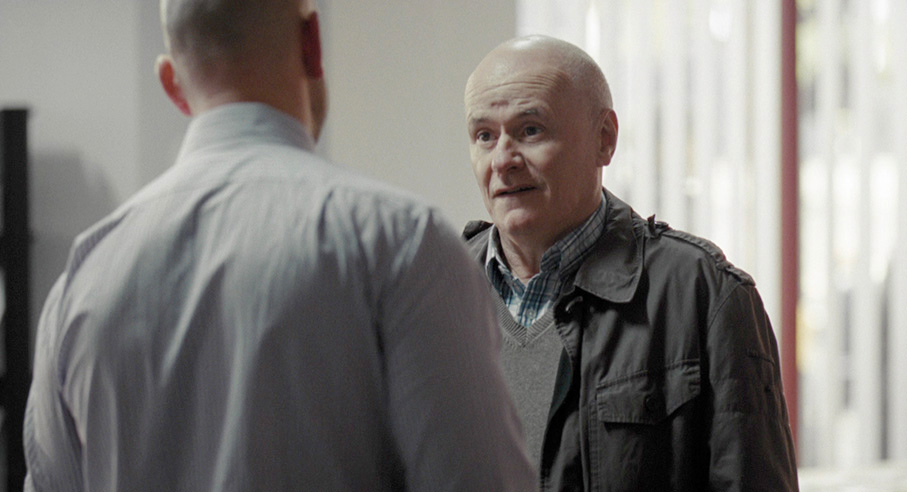
The first scene opens with dialogue before there are any visuals. You can hear the questioning voice in isolation, which not only focuses your attention on it, but also gives an idea of what speaking on the phone to these people is like, as Daniel Blake is seen having to do a little later – that particular tone of voice used by someone who asks these same questions all the time, polite but slightly monotone, slightly distracted, maybe a cynical inflection here and there. We also hear the main character's voice before seeing him, which in contrast is full of urgency and personality. Dave Johns conveys a strong sense of who Daniel (Dan to his friends) Blake is even at this very early stage. He is a man of integrity, warmth and humour, and Johns' background in comedy is channelled just the right amount. He is also a man who has found himself in a place where he must rely on the state benefit system through no fault of his own. Director Ken Loach and long time collaborator, writer Paul Laverty, have spoken about how they wanted their central character to be someone in no extraordinary circumstances, an everyman type that anyone might encounter on the streets of Newcastle where the film takes place, and not an extreme case from their exhaustive research. (Loach invites one to stand in his titular characters' shoes with the title of the piece, as with his earlier My Name Is Joe.) Dan is recovering from a heart attack, which is sadly the most everyman condition for a man of his age and very much something that could happen to anyone. He is also a working class man with a learned practical trade, carpentry in this particular case. But he is a grafter of the type found in Loach's 1991 film Riff-Raff, also sharing the working class spirit of community and humour from that film. Where Dan is different though is how he has been taken away from this community, first due to caring for his wife and then down to his own ill-health, his social interactions reduced to the immediate surroundings of his neighbourhood. For many people this is a reality and can remain so, and once one has faded from view in society it can be too much for some, especially those with health problems, to return to it on any concrete basis. But Dan is fated to cross paths with someone who makes him reconnect with the humanity that still exists outside his bubble of daily soul-crushing drudgery.
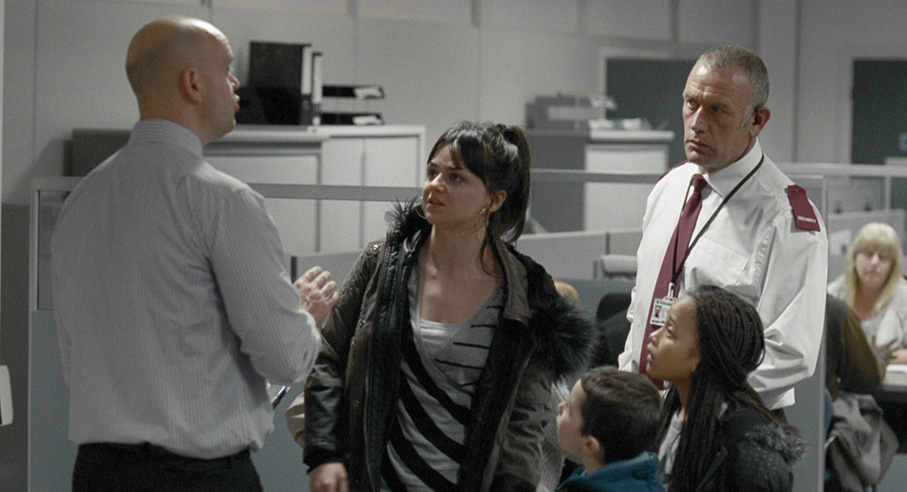
For Dan, the frustrating hell that is the job centre and it's endless bureaucratic maze is also an environment where he has contact with the outside world, and paradoxically it becomes the venue that presents him with hope in the form of a young woman whose displacement by the system is geographical as well as the marginilisation Dan shares with her. Katie, played by Hayley Squires, is a young single mum of two who, after a period in a hostel, has been relocated to Newcastle due to lack of council housing in London. Her housing situation sheds light on other aspects of the DWP, as do the consequences of not fully complying to the rigid rules that they have set in place. She enters the film, and Dan's life, when she is sanctioned for being a few minutes late to her job centre appointment, which results in her benefit being suspended. Her frustration is angrier and more desperate than Dan's at this point in the film, and her reaction to the situation contrasts with his more mature and wearisome approach. When he offers a practical solution to her problem, he is seen as a trouble-maker by the security personnel and is forced to leave the building, along with the stricken Katie and her two children. The rejection of a solution by the DWP staff, due to it's perceived failure to comply with their stringent regulations, encapsulates the disconnect between the dehumanising bureaucracy of the state and the more practical and fluid problem-solving ways of an empathetic community, a sentiment that is echoed throughout the movie.
As the narrative progresses, the friendship forged between these two central characters is as authentic as you would expect from a Loach film. Dan is able to use his practical knowledge to help Katie and her family and she becomes for him a substitute for the daughter that he never had. It is also touching how Dan develops these paternal feelings for Katie, making it all the more heart-wrenching when their deepening bond is tested later, as Katie makes a desperate move to put food on the table for her children.
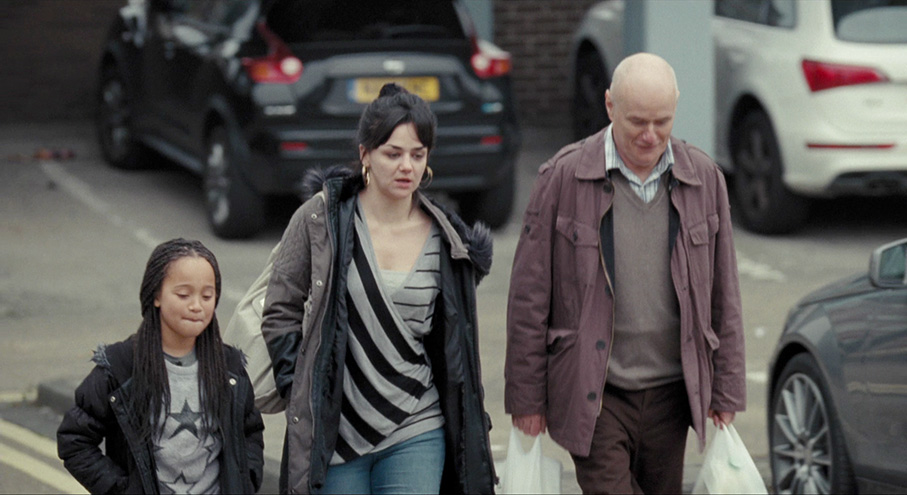
Before that point in the story, Dan's impossible situation is highlighted when, due to the delay in appealing a decision to disallow his benefit application, he is forced to go on the dole and to prove that he is looking for work, even though he is unable to actually take any jobs offered due to his appeal. Laverty shows how the stereotype of the feckless and work-shy benefit scrounger can be perpetuated in realistic terms in a scene where Dan has to turn down an offer for work, which prompts the employer to think he is just playing the system. Many have highlighted the scene with Katie at the food bank as being a defining one, but that specifically tied to her story, which is a more outwardly dramatic one than Dan's, and you can see her distress more distinctly than Dan's quietly burning despair. For me, this discussion with a potential employer, which takes place over the phone, is the perfect example of another quiet moment that chips away at this man's will. It is a significant blow to his pride to be seen as a shirker by someone he views as a peer, a working man like himself.
Although it is heartbreaking to see the incremental erosion of both characters' lives, conversely there is hope to be found in how they both refuse to give in. Dan and Katie's determination to survive in any way that they can is as wonderful as it is painful to endure. There is a support network from neighbours, members of the general public and the working class – in the scene following Dan's phone call, Katie is let off a shoplifting charge by the manager who is sympathetic to the young woman's obviously terrible situation. This kindness is seen all over, whether in Dan's Del Boy-esque young friend and neighbour China giving him a helping hand with technology or the kindly people at the food bank, there are many examples that show the strength that can be found in community, very much supporting Loach's socialist politics. When I first saw the film, I was worried about an 'us-and-them' over-simplification and a danger of a black-and-white, public against the system depiction of society. Seeing some of the job centre workers only in the context of their capacity at work in the offices does give them a bit of an otherly feel, and as they are themselves, in the most part, members of the same working class society as our protagonists, I do find this slightly problematic. But to Dan and people like him, these workers can be seen as different and apart from themselves and their worries, so it is an interesting aspect of the film to wrestle with.
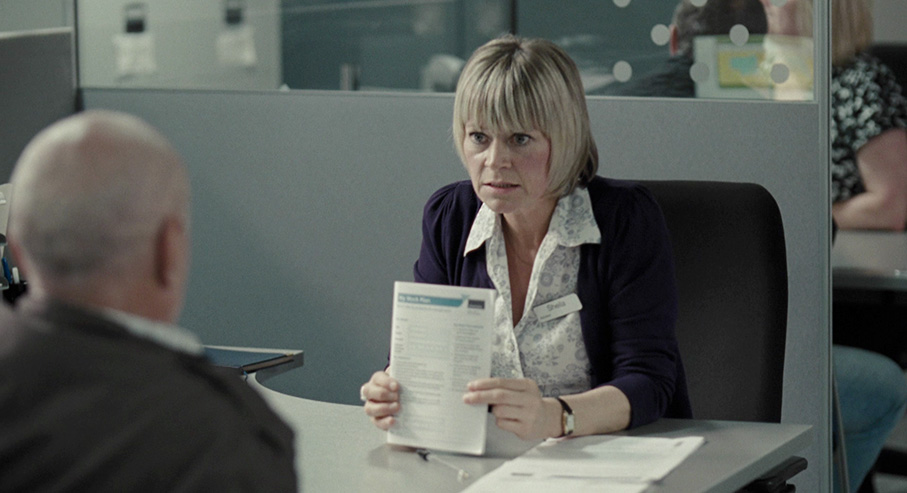
In its tragic conclusion, Loach and company do rather drive home the importance of the toll taken on our protagonist, but there really was no other way to conclude a script that nails it's colours to the mast so brazenly. This is a vital film for our time and place in the world, as all great social commentary should be and I firmly believe that I, Daniel Blake is one of the finest films in Loach's incredible career. Whether you share its politics or not, there is no denying the actors give the film a beating heart that few will not be moved by. The performances are uniformly brilliant, led by Johns' perfectly judged central depiction of a likeable man whose resilience is worn down by a rigid procedural system, while Squires' Katie has a desperation so acutely real and her character is so astutely observed throughout, that she makes the audience feel every second of humiliation with her. Briana Shann, who plays her daughter, Daisy, is also worth a mention, having a softly sincere quality to her touching interactions with Dan that is pitched authentically enough to not come off as overly sentimental. Even Dan's neighbour China, played by Kema Sikazwe, has a lovely energy and is placed, like everyone, to reveal a certain aspect of Dan's personality – here his paternal characteristics come out again, but fall on the side of masculine knockabout banter.
We all know a Daniel Blake, and none of us would want to see him end up like the one in this film. The worst thing is that in reality, it happens all the time. I know.
Unlike an increasing number of mainstream and independent features, I, Daniel Blake was shot on 35mm film rather than an HD digital substitute. This is not a film of bright colours and dynamic lighting, but the documentary aesthetic is very cleanly reproduced on Entertainment
One's Blu-ray and the shadows that fall on faces feel appropriate to the location light. The detail is crisp, the contrast well balanced and while the colours palette is muted, this is as much down to production design, costume and lighting as it it is to post-production grading and was clearly deliberate.
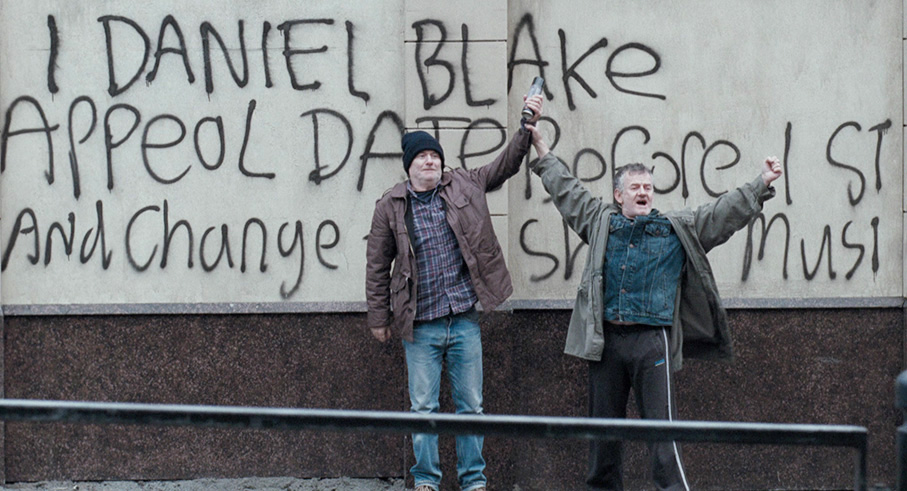
There are two DTS-HD Master Audio tracks here, stereo 2.0 and surround 5.1, and while the surround track has no show-off aspects, the mix is more subtle here and the dialogue feels more organic to the location than on the slightly cruder stereo mix. Location background sound is also spread effectively around the room on the surround track. Both tracks are very clear and you should have no problem following the dialogue even in quieter scenes.
Optional English subtitles for the deaf and hearing impaired are available, and there's also an audio descriptive track for the sight impaired.
How To Make A Ken Loach Film (38:05)
For it's running time of a little over thirty five minutes, this little film manages to pack a lot in. Covering pre-production casting and auditions, through to location shooting, editing, and the resultant receipt of the Palme D'or at Cannes by Loach. The director of this documentary, Emmanuel Roy, interviews everyone from sound recordist, cinematographer, producer to casting director – this insight is interesting, but functions as a whistle-stop tour of the Loach machine, and anyone already familiar with the director's processes will be unlikely to learn anything new here. I found the footage of Johns doing a realist cinema costume fitting the most unusual and entertaining part of the film, showing his naturally funny personality when he suggests his character should always carry a dormouse in his pocket.
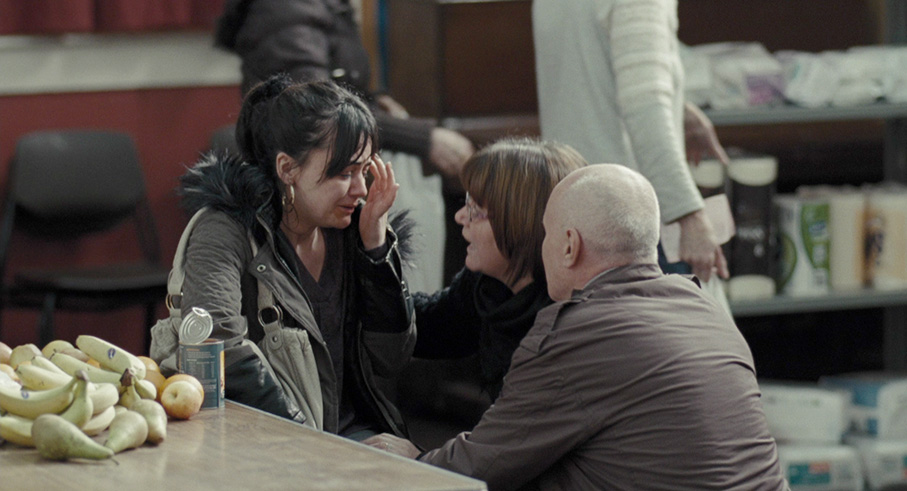
Audio commentary with Director Ken Loach and Writer Paul Laverty
This is a great commentary track from Loach and Laverty, with information on both the filmmaking process and the inspiration and motivation for the project. They both speak passionately about the welfare system and their exhaustive research on the topic. Laverty, as is perhaps expected, has a bit more to say about the politics that are prominent in the story he has crafted, justifying the choices made for dramatic purposes in view of the reality of researched cases as bad or worse than the ones depicted in the film. He speaks of propaganda created against those claiming benefits in the media to reinforce stereotypes of laziness and fraud. There isn't a lot of film form discussed but Loach talks about casting with authenticity in mind, from the central characters to the job centre staff and the voices on the end of a phone in the call centres. He also touches on cinematography, the choice to have an observational quality to camera positioning, with little in the way of invasive close-ups, and the use of a muted colour palette with natural lighting suiting the urban setting and the formal austerity of some of the indoor locations. But it is really when they talk fervidly about what has driven them to make such a film that the commentary is at its best, with Laverty sometimes not being able to keep his vitriol under wraps concerning the governments decisions and ideas, both in policy and also in reaction to the film since it's release. Especially moving is his opinion that prisoners are give better rights than the poor and the sanctioning of benefits being 'a sentence to hunger'.
Deleted Scenes (7:38)
This reel is of only Dan and no Katie unfortunately. It contains a short scene outside the job centre then a short excerpt of another conversation with the benefit office showing a more aggressive and frustrated Dan, which was, in my mind, correctly not included in the final cut. There is more footage from the CV workshop Dan is forced to attend and a chat highlighting someone else's problems with the benefit system, which as far as I could gather takes place after the workshop. Their are a few exchanges with members of the public on the street and Dan circling jobs in the newspaper at his flat. Last is the longest and best scene to be left out of the film, where the more dishevelled looking Dan with stubble and woolly hat from later in the narrative is seen posting something to solicitors and talking to a policeman whose father knows Dan. The policeman gives him a lift home and he then jokes with his neighbour China about how he was interrogated by the police about his dodgy trainer selling enterprise, denoting another bit of the character's capacity for levity.
I, Daniel Blake is a piece of film-making that demands its issues to be confronted head on and shows how Ken Loach, remarkably in his eighty-first year at the time of writing, has far from mellowed in his old age. He continues to address important and topical issues and has never been more relevant than in this political climate. I wonder if his are the kind of films Jeremy Corbyn would be making if he had been a film maker. There is no doubting they share intent and motivation.
|